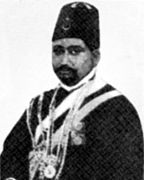Anjuman-i-Ulama-i-Bangala
Appearance
আঞ্জুমান-ই-উলামা-ই-বাঙ্গালা | |
| Abbreviation | AUB (আউবা) |
|---|---|
| Named after | Islam in Bengal |
Region | Bengal |
Official language | Bengali, Arabic |
| Islam in Bangladesh |
|---|
 |
Anjuman-i-Ulama-i-Bangala (
Muslim religious leaders in British India's Bengal Presidency.[1] It later formed a branch of the Jamiat Ulema-e-Hind
by the name Jamiat Ulema-e-Bangala in 1921.
History
The association was established in March 1913 at a conference in Beniapara,
Muhammad Abdullahil Baqi and Muhammad Shahidullah.[2] The first president and secretary of the Anjuman was Mohammad Akram Khan with Maniruzzaman Islamabadi as joint secretary.[3] Ismail Hossain Siraji was also a notable member of the organisation.[4] Aiming to bring about Muslim unity, regardless of sects, and prevent Muslims from converting to Christianity.[5]
On 3 May 1915, the association initiated an illustrated monthly Bengali publication known as Al-Eslam, with Akram as chief editor.[2] Notable writers for the paper included Begum Rokeya and Fazlul Hoque Selbarsi. Over 1500 copies were in circulation. It contained articles on history, literature, philosophy, and cultural heritage.[6]
Two years later, they hosted their second conference in
Calcutta, promoting the sale of native goods. The uprisings changed the socio-politics in India and the association was eventually disbanded in 1921 to merge with the Jamiat Ulema-e-Bangala, a regional branch of the Jamiat Ulema-e-Hind.[2]
Aims
Its aims included providing
maktabs, madrasas, bayt al-mal and social arbitration boards were founded and funded by the organisation; bringing about solidarity and a strong morale amongst Muslims. They popularised the use of the Bengali language amongst the Muslim middle-class.[8] There was also an aspiration of establishing an Islamic university in Chittagong although this never came into being.[7]
Members
-
Abul Kalam Azad
See also
- Faraizi Movement
- Muharram Rebellion
- Titumir
References
- ISBN 9004106421. Retrieved 8 March 2015.
- ^ a b c Samaddar, Ranabir. Emergence of the Political Subject. India: SAGE Publications Ltd. pp. 85–96.
- ^ Chatterjee, Srilata (2003). Congress Politics in Bengal 1919-1939. Anthem Press. pp. 46, 111.
- ^ Anwarul Karim (15 Sep 2018). "Syed Ismail Hossain Siraji: A Tribute". The Daily Star (Bangladesh).
- Oxford UniversityPress. p. 96.
- ^ Sarkar, Chandiprasad (1991). The Bengali Muslims: A Study in Their Politicization, 1912-1929. K.P. Bagchi & Company. pp. 60–199.
- ^ OL 30677644M. Retrieved 15 June 2024.
- OL 30677644M. Retrieved 15 June 2024.





